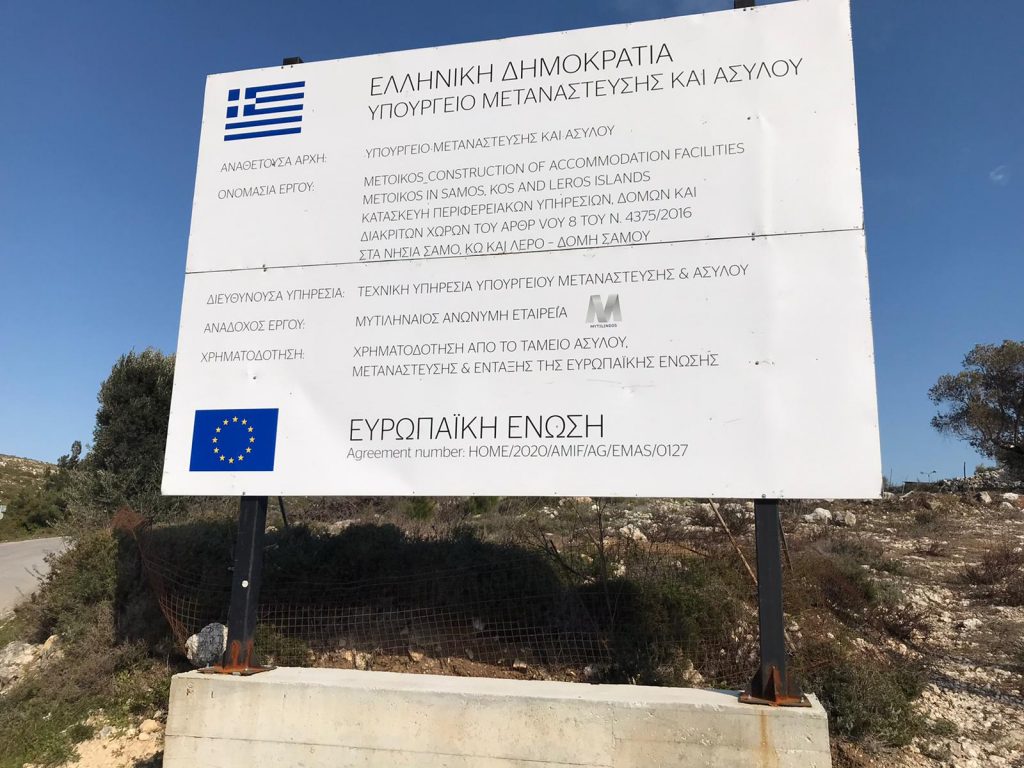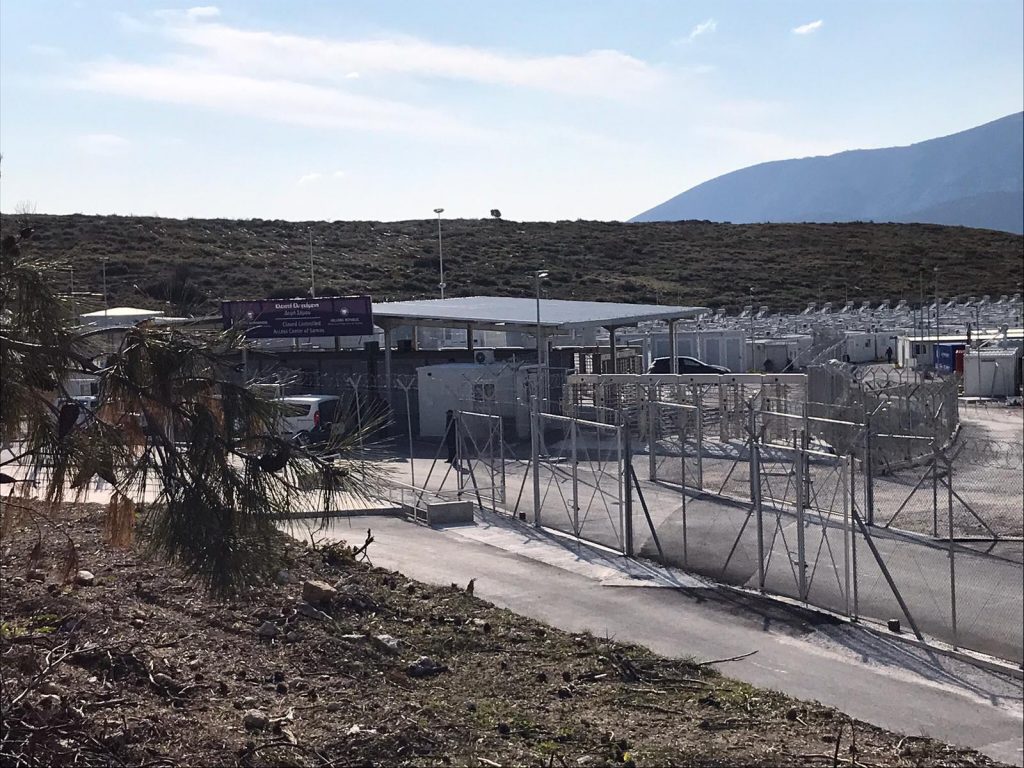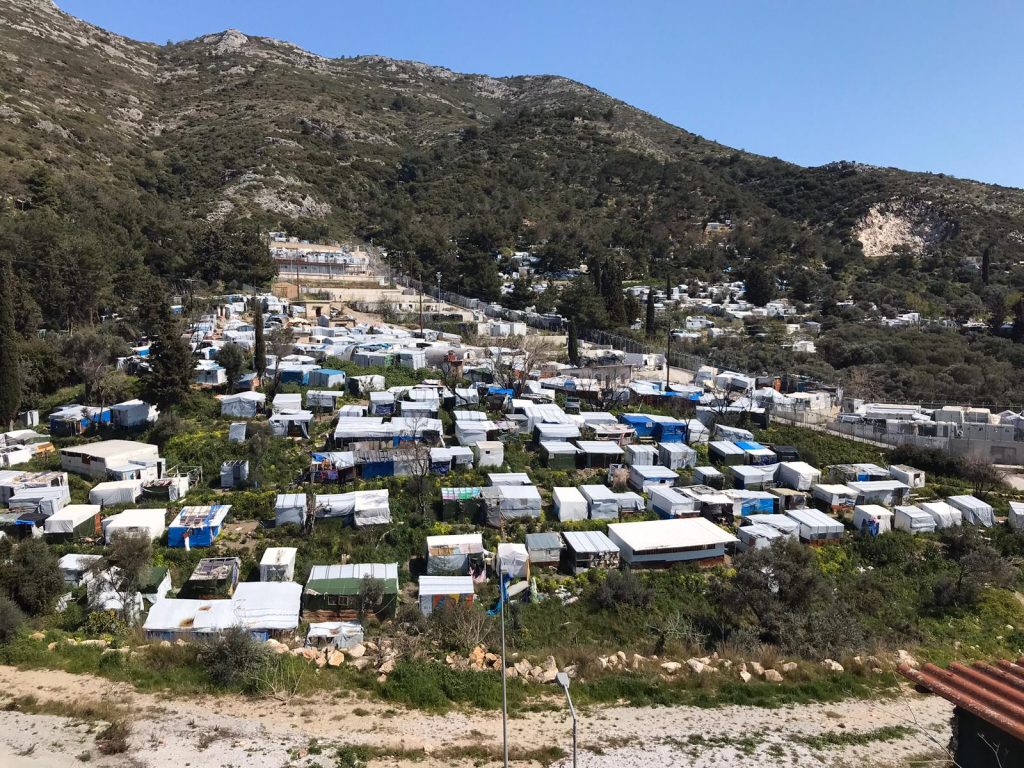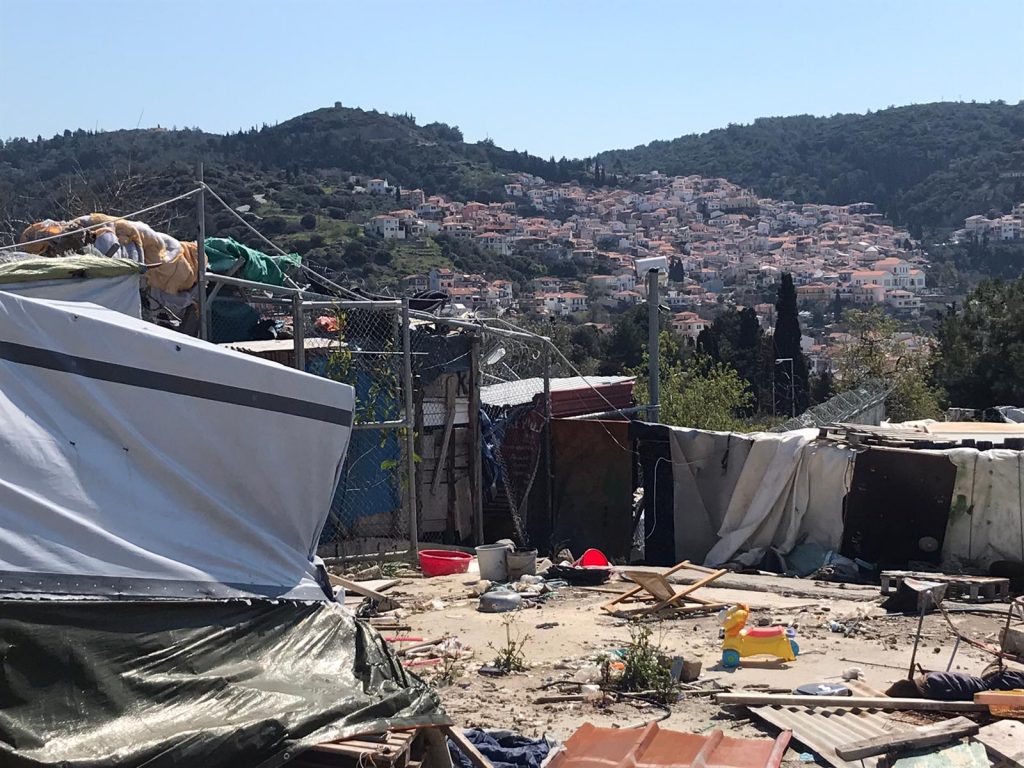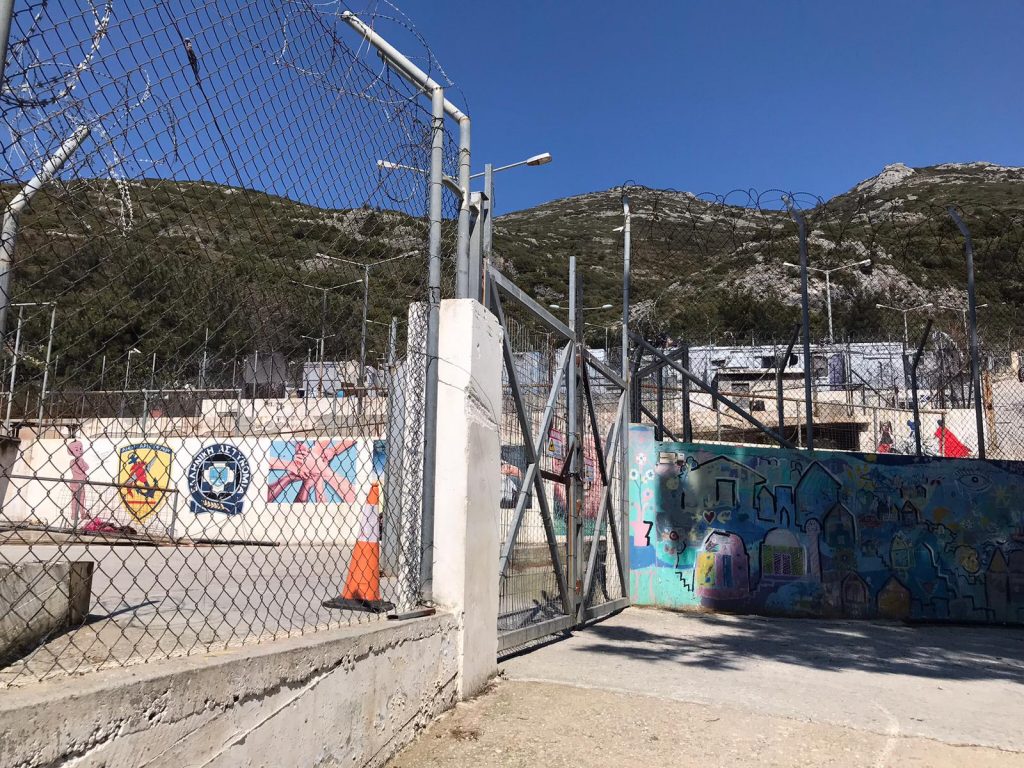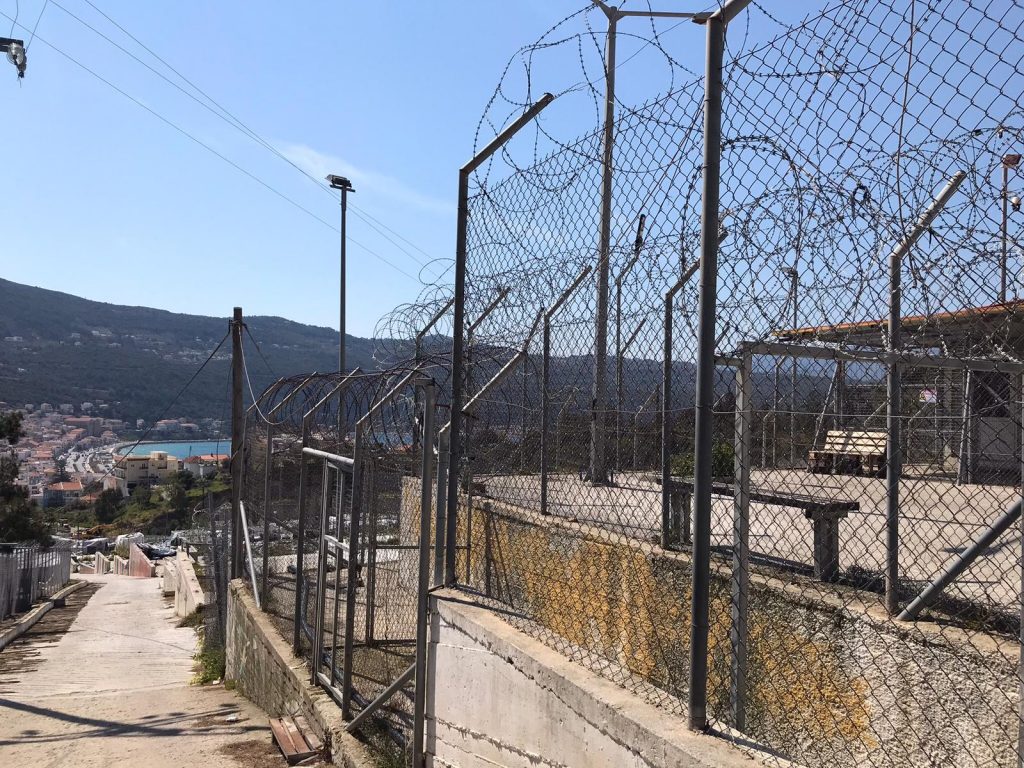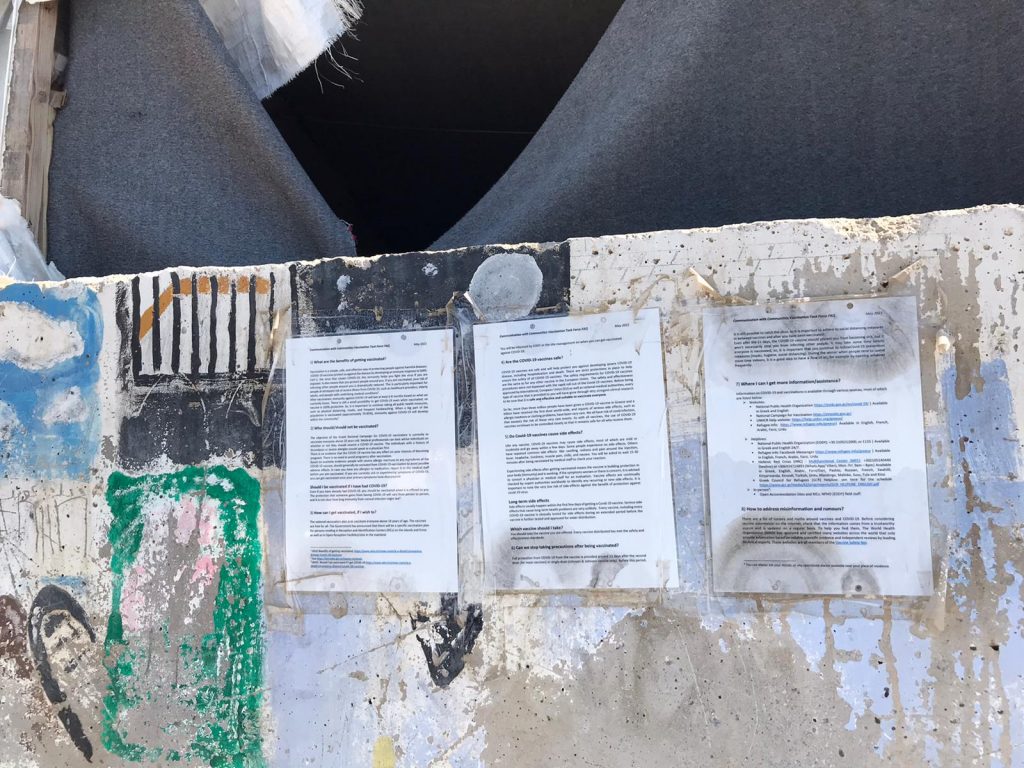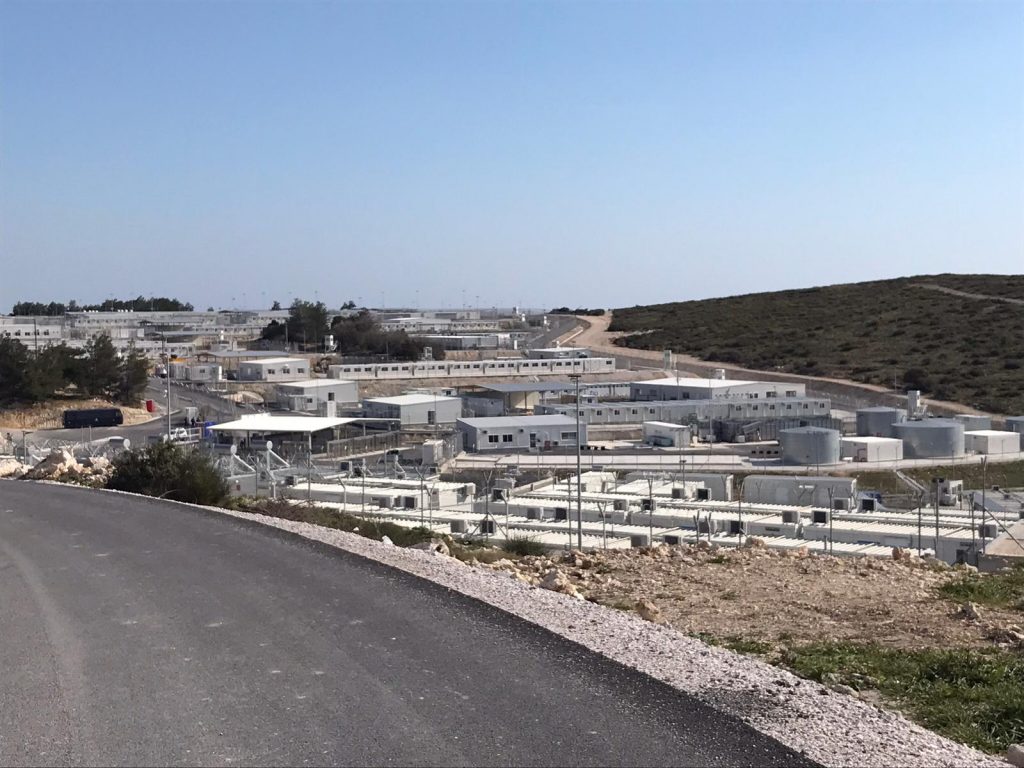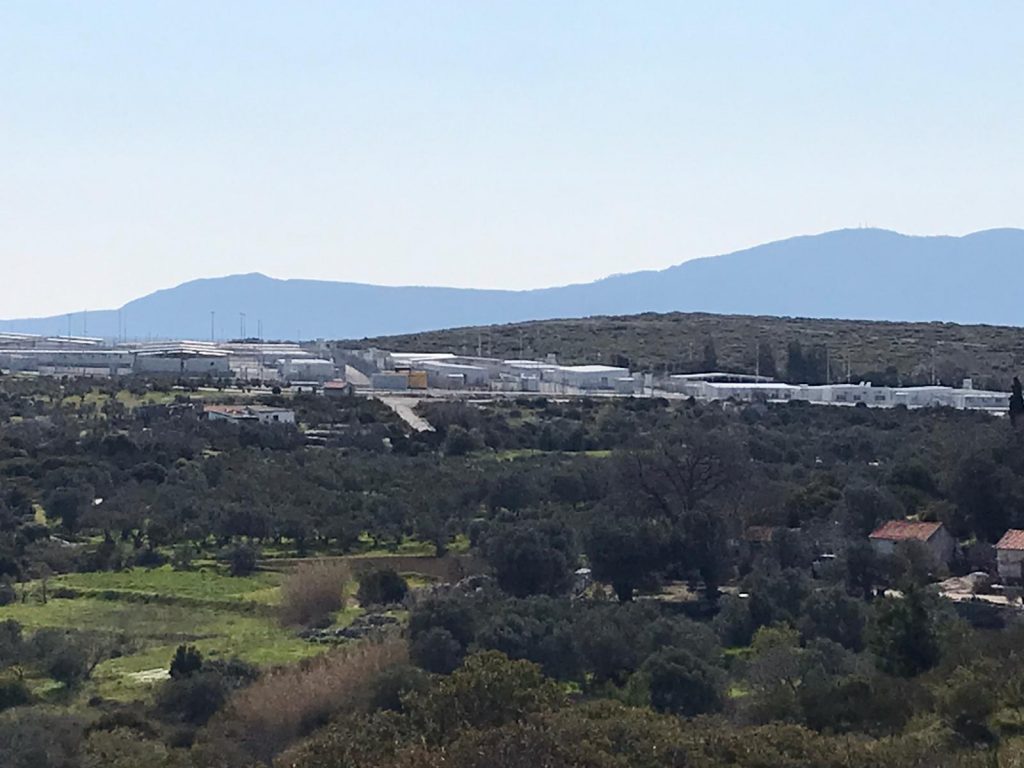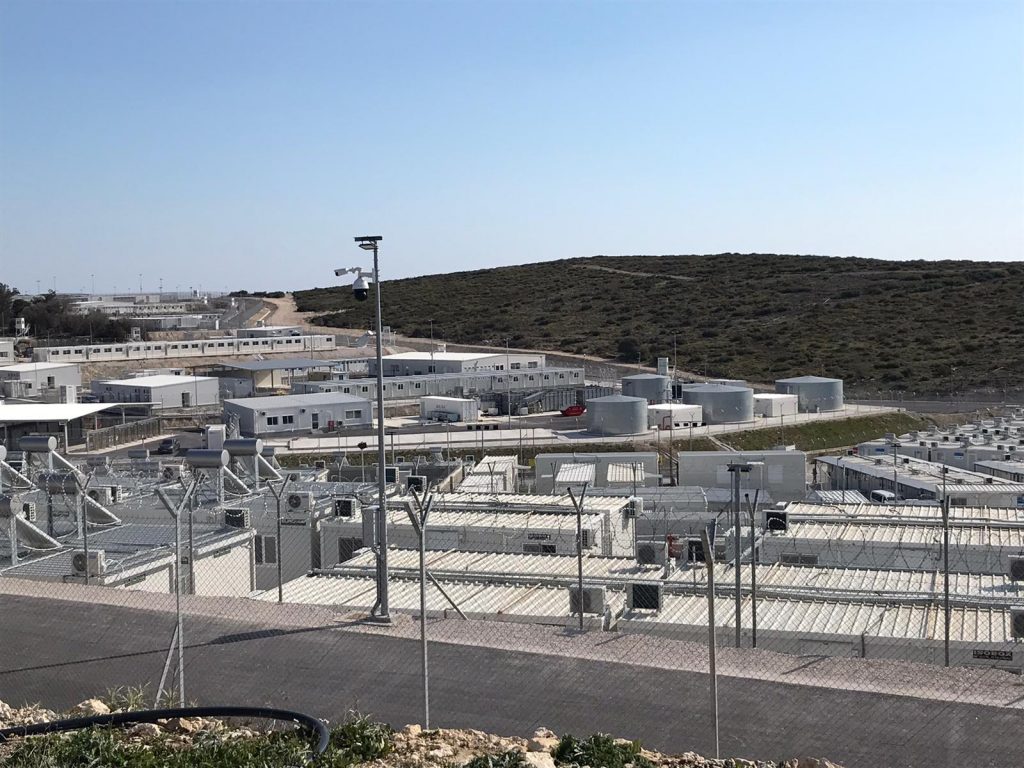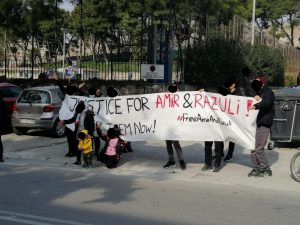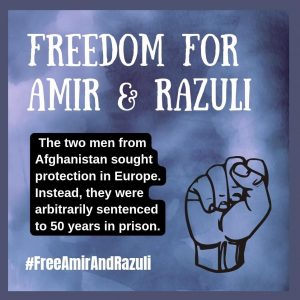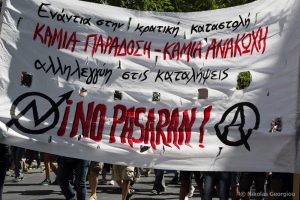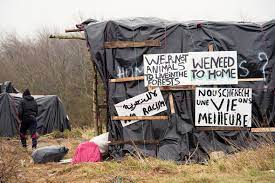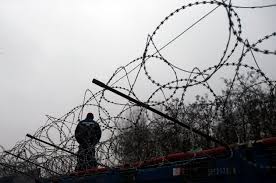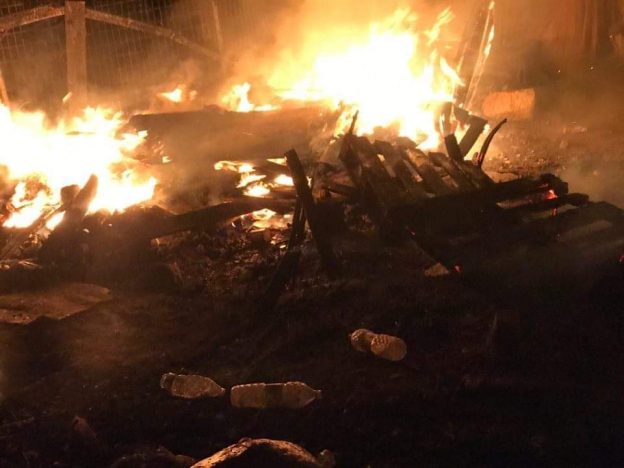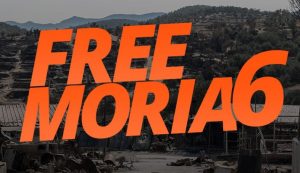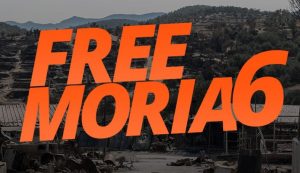(Ελληνικά, Deutsch, Italiano, Español, فارسی, below)
On Tuesday, 22 June, the trial against the Vial 15 will take place in the court of Mytilini, Lesvos Island. 15 people from different countries have been accused for riots and fire within the EU Hotspot Camp Vial on Chios Island on the night of 18-19 April 2020. The arrests followed protests against the inhumane conditions of Vial camp after a women died in an isolation container.
The 15 defendants are charged with arson with risk to human life, destruction of private property, causing injuries to people and forming a criminal group. As we have seen in many cases such as the recent trial against the Moria 6, they have been arrested without thorough investigation.
The only evidence against most of the defendants is that a police officer claimed to have recognized them in the police data base on his computer based on their appearance such as heigh and hair colour. However, the protests happened at night. The police heavily attacked the protestors with teargas and the people had their faces covered – with masks because of the Covid-19 pandemic and scarfs because of the teargas grenades and the heavy smoke coming from the fire. Only few people were arrested on the same day simply based on the fact that they were carrying lighters or knifes – which are commonplace objects in a camp, needed for cooking and smoking. The majority of the defendants were arrested between two and twenty days after the fire.
At the time, about 7000 people were living in Vial, a camp whose infrastructure is only designed for 1000 people. Most of the people live in an informal area in self-built huts and shelters under fatal hygienic conditions. The 15 people were arrested during the first wave of the COVID-19 pandemic, a period of great insecurity how the virus would affect the camp residents. The Greek and European authorities managing the camps reacted mainly by trying to quarantine the residents in the camps through strict curfews and fines. While people were unable to leave the camp, hardly any medical or hygienic precautions were taken within the camps, making the people feel even more abandoned.
After the death of a 47-year old woman from Iraq, the situation escalated and protests broke out. The woman died, reportedly from either a heart attack or an obstruction. She had been to hospital two days previous with bradycardia and arrhythmias where she was tested for COVID-19 and given medication. Once she returned to Vial, she was locked in one of the new containers outside the camp, as an isolation precaution, and had a panic attack. Her husband found her dead in the container.
No one has been held accountable for the death of the women in Vial camp and all the unknown death within the camps and at sea as well as for the suffering of the people. Instead, 15 people selected on flimsy evidence will now be punished for the destruction of the camp facilities. They have already been punished without any court procedure, being held in pre-trial detention for one year and two months. The court has been postponed twice because of COVID-19, it is the third time that they are transferred in handcuffs to Mytilene Police Station.
Although there is no credible evidence, we are afraid that they will be convicted and criminalized as the scapegoats for the European and Greek migration policies, creating unbearable living conditions in camps on the Greek Islands. We have seen how the Moria 6 were sentenced to 5 and 10 years imprisonment, although the procedure was full of flaws and the only witness of the accusation did not appear in court.
We are tired of watching this senseless destruction of peoples’ lives. The criminalization of migrants’ protests has to stop.
The crime is not that Vial and Moria were burned, the crime is their existence!
Free the Vial 15!
Απελευθέρωση στους 15 της ΒΙΑΛ!
Την Τρίτη, 22 Ιουνίου, θα πραγματοποιηθεί η δίκη εναντίον των ΒΙΑΛ 15, στο δικαστήριο της Μυτιλήνης στη Λέσβο. 15 άνθρωποι από διαφορετικές χώρες κατηγορήθηκαν για ταραχές και πυρκαγιές στο χοτ σποτ της ΒΙΑΛ στη Χίο, τη νύχτα από τις 18 στις 19 Απριλίου 2020. Ως αποτέλεσμα των συλλήψεων, ακολούθησαν διαμαρτυρίες από τους μετανάστ(ρι)ες ενάντια στις απάνθρωπες συνθήκες του καμπ της ΒΙΑΛ, μετά από τον θάνατο μιας γυναίκας που έχασε την ζωή της σε ένα κοντέινερ απομόνωσης.
Οι 15 κατηγορούμενοι κατηγορούνται για εμπρησμό με κίνδυνο την ανθρώπινη ζωή, καταστροφή ιδιωτικής περιουσίας, προκαλώντας τραυματισμούς σε ανθρώπους και για συμμετοχή σε εγκληματική συμμορία. Όπως έχουμε δει σε πολλές αντίστοιχες περιπτώσεις, όπως και στο πρόσφατο δικαστήριο εναντίον των 6 της Μόριας, συνελήφθησαν χωρίς να έχει πραγματοποιηθεί καμία έρευνα.
Μόνο δύο άτομα συνελήφθησαν την ίδια μέρα, απλά με βάση το γεγονός ότι κουβαλούσαν αναπτήρες ή μαχαίρια – που είναι κοινά αντικείμενα σε ένα καμπ που απαιτούνται για το μαγείρεμα και το κάπνισμα. Τα υπόλοιπα 13 άτομα συνελήφθησαν μεταξύ δύο και είκοσι ημερών μετά την πυρκαγιά. Τα μόνα στοιχεία εναντίον των περισσότερων είναι ότι ένα αστυνομικός ισχυρίστηκε ότι τους αναγνώρισε στην βάση δεδομένων της αστυνομίας στον υπολογιστή του με βάση την εμφάνιση τους όπως είναι το ύψος τους και το χρώμα των μαλλιών τους. Ωστόσο οι διαμαρτυρίες συνέβησαν τη νύχτα. Η αστυνομία επιτέθηκε έντονα στους διαδηλωτές με δακρυγόνα, και ο κόσμος είχε τα πρόσωπα τους καλυμμένα – με μάσκες λόγω της πανδημίας covid – 19 και με μαντήλια λόγω της ρίψης των δακρυγόνων, των κρότων λάμψης και τον βαρύ καπνό που προερχόταν από τη φωτιά.
Ο θάνατος μιας 47χρονης γυναίκας από το Ιράκ, ήταν ο λόγος που ξεκίνησαν οι διαδηλώσεις στο καμπ της ΒΙΑΛ. Σύμφωνα με πληροφορίες, πέθανε είτε από καρδιακή προσβολή είτε από απόφραξη. Βρισκόταν στο νοσοκομείο, δύο ημέρες πριν με βραδυκαρδία και αρρυθμίες. Την έλεγξαν για covid – 19 και της έδωσαν φάρμακα. Μόλις επέστρεψε πίσω στη ΒΙΑΛ, ήταν κλειδωμένη σε ένα από τα καινούρια κοντέινερ έξω από το καμπ, που χρησιμοποιούνταν ως χώροι απομόνωσης, και κατέληξε να παθαίνει κρίση πανικού. Ο σύζυγος της την βρήκε νεκρή στο κοντέινερ. Εκείνη την περίοδο, περίπου 7000 άτομα διέμεναν στο καμπ της ΒΙΑΛ, που έχει σχεδιαστεί μόνο για 1000 άτομα.
Οι περισσότεροι από τους διαμένοντες μένουν σε μία άτυπη περιοχή γύρω από το καμπ σε καλύβες με άθλιες συνθήκες υγιεινής. Τα 15 άτομα συνελήφθησαν κατά το πρώτο κύμα της πανδημίας του COVID – 19, μία εποχή που επικρατούσε τεράστια ανασφάλεια για το πως η πανδημία θα επηρεάσει τους διαμένοντας στο καμπ.
Οι ελληνικές και ευρωπαϊκές αρχές που διαχειρίζονται τα καμπ, αντέδρασαν κυρίως προσπαθώντας να βάλουν σε καραντίνα τους διαμένοντες επιβάλλοντας αυστηρές απαγορεύσεις και πρόστιμα. Ενώ οι άνθρωποι δεν μπορούσαν να φύγουν από το καμπ, κανένα μέτρο προστασίας δεν λήφθηκε μέσα στα καμπ, κάνοντας τους ανθρώπους να αισθάνονται ακόμη πιο απομονωμένοι. Μετά τον θάνατο της Ιρακινής, ο φόβος αυτός μετατράπηκε σε διαμαρτυρία.
Κανείς δεν έχει θεωρηθεί υπεύθυνος για τον θάνατο της γυναίκας στο καμπ της ΒΙΑΛ και όλους τους υπόλοιπους θανάτους που δεν γνωρίζουμε μέσα στα καμπς όπως και για τα βάσανα που έχουν υποστεί αυτοί οι άνθρωποι εκεί μέσα.
Αντ’αυτού 15 άτομα επιλέχθηκαν σε μία τελείως τυχαία βάση, για να τιμωρηθούν για την καταστροφή των εγκαταστάσεων του καμπ. Έχουν ήδη τιμωρηθεί χωρίς καμία δικαστική διαδικασία, έχοντας κριθεί ήδη προφυλακιστέοι εδώ και ένα χρόνο και δύο μήνες. Το δικαστήριο έχει αναβληθεί δύο φορές λόγω της πανδημίας, είναι η τρίτη φορά που μεταφέρονται με χειροπέδες στο αστυνομικό τμήμα Μυτιλήνης.
Αν και δεν υπάρχει κανένα αξιόπιστο στοιχείο, φοβόμαστε ότι θα καταδικαστούν ως ο αποδιοπομπαίος τράγος για τις ευρωπαϊκές και ελληνικές πολιτικές μετανάστευσης, δημιουργώντας αφόρητες συνθήκες ζωής στα καμπς στα ελληνικά νησιά. Είδαμε πως καταδικάστηκαν οι 6 κατηγορούμενοι για την Μόρια,
σε 5 και 10 χρόνια φυλάκισης αντίστοιχα, ενώ η διαδικασία ήταν γεμάτη κενά και ο μόνος μάρτυρας κατηγορίας δεν εμφανίστηκε καν στο δικαστήριο. Έχουμε κουραστεί να βλέπουμε αυτή την παράλογη καταστροφή των ανθρώπινων ζωών.
Η ποινικοποίηση των διαμαρτυριών των μεταναστ(ρι)ών δεν μπορούν να συνεχίσουν. Απελευθέρωση στους 15 της ΒΙΑΛ.
Freiheit für die Vial 15!
Am Dienstag, den 22. Juni, findet der Prozess gegen die Vial 15 vor dem Gericht in Mytilini auf der Insel Lesbos statt. 15 Menschen aus verschiedenen Ländern werden beschuldigt, in der Nacht vom 18. auf den 19. April 2020 im EU-Hotspot-Camp Vial auf der Insel Chios randaliert und Feuer gelegt zu haben. Die Festnahmen folgten Protesten gegen die unmenschlichen Bedingungen im Lager Vial, nachdem eine Frau in einem Isolationscontainer gestorben war.
Den 15 Angeklagten wird Brandstiftung mit Gefährdung von Menschenleben, Zerstörung von Privateigentum, Körperverletzung und Bildung einer kriminellen Vereinigung vorgeworfen. Wie bereits in vielen vorausgegangenen Fällen, wie z.B. kürzlich im Prozess gegen die Moria 6, wurden auch sie ohne stichhaltige Ermittlungen und auf der Basis zweifelhafter Indizien verhaftet.
Der Großteil der Angeklagten wurden erst im Verlauf der folgenden 3 Wochen nach dem Feuer verhaftet. Der einzige „Beweis“, der gegen die meisten von ihnen vorliegt, ist die Aussage eines Polizeibeamten, der sie in der Polizeidatenbank aufgrund ihres Aussehens, Größe und Frisur erkannt haben will. Die Festnahmen stützen sich auf diese zweifelhafte Grundlage, obwohl die Proteste bei Nacht stattfanden und die Demonstrant*innen ihre Gesichter mit Schals und Masken bedeckt hatten – einerseits als COVID-19 Prävention, andererseits aufgrund der Rauchentwicklung im Lager und um sich vor dem massiven Tränengasbeschuss durch die Polizei zu schützen. Nur wenige der Angeklagten wurden noch am selben Tag des Feuers verhaftet, einzig aufgrund der Tatsache, dass sie Feuerzeuge oder Messer bei sich trugen – Gegenstände, die in einem Camp alltäglich sind und zum Kochen und Rauchen benötigt werden.
Zum Zeitpunkt der Festnahmen lebten etwa 7000 Menschen in Vial, einem Lager, dessen Infrastruktur nur für 1000 Menschen ausgelegt ist. Die meisten Menschen sind gezwungen in einem inoffiziellen Bereich in Zelten oder selbstgebauten Hütten unter fatalen hygienischen Bedingungen leben. Die 15 Personen wurden während der ersten Welle der COVID-19-Pandemie verhaftet, einer Zeit großer Unsicherheit und Unklarheit, wie sich das Virus auf die Situation der Lagerbewohner*innen auswirken würde. Die griechischen und europäischen Behörden, die die Lager verwalten, reagierten auf die Pandemie vor allem mit Versuchen die Bewohner*innen der Lager durch strenge Ausgangssperren und Geldstrafen unter Quarantäne zu stellen. Während die Menschen über Monate im Lager eingesperrt waren, wurden kaum medizinische oder hygienische Vorkehrungen getroffen, wodurch sie sich noch mehr im Stich gelassen fühlten.
Nach dem Tod einer 47-jährigen Frau aus dem Irak eskalierte die Situation und Proteste brachen aus. Die Frau starb Berichten zufolge an Herz- oder Lungenversagen und war zwei Tage zuvor mit Bradykardie und Herzrhythmusstörungen ins Krankenhaus eingeliefert, auf Covid-19 getestet und mit Medikamenten versorgt worden. Nach ihrer Rückkehr ins Lager Vial wurde sie als Isolationsmaßnahme in einem der neuen Container außerhalb des Lagers eingesperrt und erlitt eine Panikattacke. Ihr Ehemann fand sie später tot im Container.
Niemand wurde bisher für den Tod der Frau im Lager Vial zur Rechenschaft gezogen. Auch die zahlreichen anderen bekannten und unbekannten Todesfälle in den griechischen Lagern und die Todesfälle auf See kamen nicht zur Anklage.
Stattdessen sollen nun 15 Personen, die aufgrund fadenscheiniger Beweisgrundlagen inhaftiert wurden, für die Zerstörung der Lagereinrichtungen den Kopf hinhalten und als Schuldige markiert werden. Bereits seit einem Jahr und zwei Monaten werden sie in Untersuchungshaft festgehalten. Zweimal wurde die Gerichtsverhandlung wegen der aktuellen COVID-19 Situation verschoben. Bereits zum dritten Mal werden sie nun für den Prozess in Handschellen zur Polizeistation in Mytilini gebracht.
Obwohl es keinerlei glaubwürdige Beweise für die Schuld der Angeklagten gibt, ist zu befürchten, dass sie verurteilt werden. Sie werden als Sündenböcke für die europäische und griechische Migrationspolitik kriminalisiert, die unerträgliche Lebensbedingungen in Lagern auf den griechischen Inseln schafft. Auch in den kürzlich stattgefundenen Prozessen gegen die Moria 6 mussten wir erleben, wie die Angeklagten in einem politischen Schauprozess voller Fehler und mit mangelhaften Beweisen zu fünf bzw. zehn Jahren Haft verurteilt wurden.
Wir sind es leid, diese sinnlose Zerstörung von Menschenleben mit anzusehen. Die Kriminalisierung der Proteste von Migrant*innen muss aufhören.
Das Verbrechen ist nicht, dass Vial und Moria in Flammen standen, das Verbrechen ist die Existenz dieser Camps!
Freiheit für die Vial 15!
Libertà per i Vial 15!
Martedì 22 giugno, presso il tribunale di Mytilini, nell’isola di Lesbo, si svolgerà il processo contro i Vial 15. 15 persone provenienti da diversi paesi sono state accusate di disordini e incendi all’interno dell’hotspot Vial sull’isola di Chios nella notte dal 18 al 19 aprile 2020. Gli arresti hanno seguito le proteste contro le condizioni disumane del campo di Vial dopo che una donna è morta in un container di isolamento.
I 15 imputati sono accusati di incendio doloso e rischio per la vita umana, distruzione di proprietà privata, lesioni personali e di essere parte di un gruppo criminale. Come abbiamo osservato in molti casi, vedi il recente tribunale contro i Moria 6, gli imputati sono stati arrestati senza un’indagine approfondita.
Solo due persone sono state arrestate il giorno stesso e semplicemente per il fatto di avere con sé accendini o coltelli, oggetti comuni in un campo e necessari per cucinare e fumare. Le altre 13 persone sono invece state arrestate tra i due e i venti giorni dopo l’incendio. L’unica prova contro la maggior parte di loro è un agente di polizia, che ha affermato di averli riconosciuti nel database della polizia sul suo computer in base al loro aspetto, principalmente all’altezza e al colore dei capelli. Tuttavia, le proteste sono avvenute di notte. La polizia ha attaccato pesantemente i manifestanti con gas lacrimogeni e le persone avevano il volto coperto – con maschere a causa della pandemia di Covid-19 e sciarpe a causa dei lacrimogeni e del fumo pesante proveniente dal fuoco.
La manifestazione nel campo di Vial è nata in seguito alla morte di una donna irachena di 47 anni. È morta, secondo quanto riferito, per un attacco di cuore o per un’ostruzione. Era stata in ospedale due giorni prima con bradicardia e aritmie. L’avevano sottoposta ad un test Covid-19 e prescritto dei farmaci. Una volta tornata a Vial è stata rinchiusa in uno dei nuovi container fuori dal campo, per precauzione in isolamento, dove ha avuto un attacco di panico. Suo marito l’ha trovata morta nel container.
A quel tempo, circa 7000 persone vivevano a Vial, un campo la cui infrastruttura è progettata solo per 1000 persone. La maggior parte delle persone vive in aree non ufficiali, in capanne autonomamente costruite e in rifugi con condizioni igieniche fatali. Le 15 persone sono state arrestate durante la prima ondata della pandemia di COVID-19, un periodo di grande insicurezza su come il virus avrebbe colpito i residenti del campo. Le autorità greche ed europee che gestiscono i campi hanno reagito cercando di mettere in quarantena i residenti nei campi attraverso rigidi coprifuoco e multe. Non solo non era possibile lasciare il campo ma al suo interno non è stata presa quasi alcuna precauzione medica o igienica, facendo sentire le persone ancora più abbandonate. Dopo la morte della donna irachena, la paura si è trasformata in protesta.
Nessuno è stato ritenuto responsabile per la morte delle donne nel campo di Vial né per tutte le morti sconosciute nei campi né per la sofferenza della gente. Al contrario, 15 persone selezionate in base a criteri sospetti dovrebbero ora essere punite per la distruzione delle strutture del campo. Sono già stati puniti senza alcuna procedura giudiziaria, essendo stati trattenuti in custodia cautelare per un anno e due mesi. Il processo è stato rinviato due volte a causa del COVID-19, è la terza volta che vengono trasferiti in manette alla stazione di polizia di Mitilene.
Sebbene non vi siano prove credibili, temiamo che vengano condannati e criminalizzati come capri espiatori delle politiche migratorie europee e greche, creando condizioni di vita insopportabili nei campi delle isole greche. Abbiamo visto come i Moria 6 siano stati condannati a 5 e 10 anni di reclusione, nonostante la procedura fosse piena di vizi e l’unico testimone dell’accusa non si fosse presentato in tribunale.
Siamo stanchi di assistere a questa distruzione insensata della vita delle persone. La criminalizzazione delle proteste dei migranti non può continuare così.
Il crimine non è che Vial e Moria siano stati bruciati, il crimine è la loro esistenza!
Libertà per i Vial 15!
¡Libertad para los 15 de Vial!
El martes 22 de junio tendrá lugar el juicio contra los 15 de Vial en el tribunal de Mitilene, Lesbos. 15 personas de diferentes países han sido acusadas por los disturbios e incendios ocurridos en el campo de Vial, parte del sistema de “hotspots” diseñado por la Unión Europea, y situado en la isla de Quíos, durante la noche del 18 al 19 de abril de 2020. Las detenciones se produjeron tras las protestas contra las condiciones inhumanas este campo, después de que una mujer muriera en un contenedor de aislamiento.
Las 15 personas están acusadas de incendio con riesgo para la vida humana, destrucción de propiedad privada, causar lesiones a personas y constitución de un grupo criminal. Como hemos visto en muchos casos, como el reciente juicio contra los 6 de Moria, estas personas fueron detenidas sin una investigación en profundidad.
La única prueba contra la mayoría de ellas es la declaración de un agente de policía que afirmó haberlas reconocido a partir de una base de datos policial. Este reconocimiento se basó en elementos de su aspecto, como la altura o el color del pelo. Sin embargo, las protestas ocurrieron por la noche, y la policía había atacado con dureza a los manifestantes con gases lacrimógenos. Por lo tanto la gente tenía sus rostros cubiertos, no solo con máscaras debido a la pandemia de Covid-19, sino también con bufandas, para protegerse de las bombas de gas lacrimógeno y el fuerte humo procedente del incendio. Algunas pocas de entre las personas acusadas fueron detenidas el mismo día por el simple hecho de llevar mecheros o cuchillos, objetos necesarios para cocinar y fumar, y por lo tanto habituales en un campo como el de Vial. Las otras 13 personas fueron detenidas entre dos y veinte días después del incendio.
En ese momento en Vial vivían alrededor de 7.000 personas, a pesar de que el campo está diseñado para 1.000. La mayor parte de las personas viven en una zona informal en chozas autoconstruidas, y las condiciones higiénicas son potencialmente mortales. Las 15 personas fueron detenidas durante la primera oleada de la pandemia de COVID-19, un periodo en el que existía una gran inseguridad sobre cómo afectaría el virus a los residentes del campo. Las autoridades griegas y europeas, responsables de la gestión de los campos, reaccionaron principalmente intentando poner en cuarentena a los residentes de los campos mediante estrictos toques de queda y multas. Mientras las personas no podían salir del campo, apenas se tomaron precauciones médicas o higiénicas dentro, lo que hizo que la gente se sintiera aún más abandonada.
Tras la muerte de una mujer iraquí de 47 años, la situación se agravó y estallaron las protestas. Al parecer la mujer murió de un ataque al corazón o de una obstrucción. Había estado en el hospital dos días antes con bradicardia y arritmias. Le hicieron la prueba de COVID-19 y le dieron medicación. Al regresar al campo de Vial la encerraron en uno de los nuevos contenedores a las afuera del campo, aislándola como medida de precaución. Durante el encierro tuvo un ataque de pánico y su marido la encontró muerta en el contenedor.
Nadie ha rendido cuentas por la muerte de esta mujer en el campo de Vial, ni por ninguna de las muertes que no se conocen, dentro de los campos pero también en el mar. Nadie rinde cuentas por el sufrimiento de las personas que viven en estos campos. En lugar de eso, 15 personas seleccionadas a partir de una base turbia deben ser castigadas ahora por la destrucción de las instalaciones del campo. Ellas ya han sido castigados sin ningún procedimiento judicial, estando en prisión preventiva durante un año y dos meses. El tribunal ha sido aplazado dos veces por culpa de COVID-19, y es la tercera vez que son trasladadas esposadas a la comisaría de Mitilene.
Aunque no hay pruebas creíbles, tememos que estas personas sean condenadas y criminalizadas como chivos expiatorios de las políticas migratorias europeas y griegas, que crean condiciones de vida insoportables en los campos de las islas griegas. Hemos visto como los 6 de Moria fueron condenados a 5 y 10 años de prisión, aunque el procedimiento estuvo lleno de irregularidades y el único testigo de la acusación no compareció ante el tribunal.
Estamos cansadas de ver esta destrucción sin sentido de la vida de las personas. La criminalización de las protestas de las personas migrantes no puede continuar así. El crimen no es que Vial y Moria hayan sido quemados, ¡el crimen es su existencia!
¡Liberen a los 15 de Vial!
آزادی برای ویال 15!
روز سه شنبه مورخ ۲۲ جون، محاکمه ای به علیه ویال 15 در دادگاه میتیلینی، جزیره لسوس اتفاق خواهد. ۱۵ فرد به تاریخ ۱۸-۱۹ اپریل سال ۲۰۲۰ متهم به شورش و به آتش کشیدن کمپ ویال اتحادیه اروپا در جزیره خیوس شدند. این دستگیری ها تظاهرات علیه شرایط غیر انسانی کمپ ویال بعد از مرگ زنها داخل کانیترهای ایزوله شده را دربر داشت.
۱۵ فرد متهم به آتش سوزی و خطر برای زندگی انسانها، تخریب ملک شخصی، زخمی کردن مردم و تشکیل یک گروه جنایت کار شده است. همانطور که ما دیدیم در موارد زیادی مثل دادگاه علیه موریا 6, آنها بدون کدام تحقیقات دقیقی دستگیر شده اند.
تنها مدرکی که علیه اکثر متهمان وجود دارد اینست که افسر پولیس ادعا کرده که آنها را از روی شکل ظاهری مثل قد و رنگ موی از داخل داده های کامپیوترشناسایی کرده است. اگرچه، این تظاهرات در شب اتفاق افتاده است. پولیس به شدت به تظاهرات کننده گان همراه با گاز اشک آور حمله کرد و مردم صورت شان را با ماسک بخاطر کوید 19 و دستمال بخاطر گاز اشک آور و دود زیادی که از آتش برخواسته بود پوشیده بودند. فقط تعداد اندکی همان روز بخاطر داشتن چاقو و فندک که اشیا عادی داخل کمپ که بخاطر آشپزی و سیگار کشیدن است، دستگیر شدند. اکثر متهمان بین دو تا بیست روز بعد از آتش سوزی دستگیر شدند.
و در عین زمان، حدود ۷۰۰۰ نفر داخل ویال زندگی میکردند، کمپی که فقط برای ۱۰۰۰ طراحی شده بود. بیشتر مردم در یک منطقه غیر رسمی در کلبه ها و پناهگاه های خودساخته تحت شرایط مهلک بهداشتی زندگی می کنند. این 15 نفر جریان موج اول بیماری همه گی دستگیر شدند، یک دوره ناامن در مورد تأثیر ویروس کوید 19 بر ساکنان کمپ. مقامات یونانی و اروپایی که مدیریت این کمپ ها را بر عهده داشتند، عمدتاً با تلاش برای قرنطینه کردن ساکنان این کمپ ها از طریق مقررات منع رفت و آمد و جریمه های شدید واکنش نشان دادند. در حالی که مردم قادر به ترک اردوگاه نبودند، به سختی اقدامات پزشکی یا بهداشتی در اردوگاه ها انجام می شد و باعث می شد مردم حتی بیشتر حس ترک شده گی را داشته باشند.
پس از مرگ یک زن ۴۷ ساله از عراق، اوضاع بالا گرفت و اعتراضات آغاز شد. گفته می شود این زن در اثر حمله قلبی یا انسداد جان خود را از دست داده است. وی دو روز قبل به دلیل برادیکاردی و آریتمی به بیمارستان رفته بود و در آنجا برای کوید 19 آزمایش شد و دارو دریافت کرد. پس از بازگشت به ویال، وی بخاطر احتیاط در یکی از کانتینرهای جدید خارج از کمپ حبس شد و دچار حمله وحشت شد. شوهرش او را در کانتینر مرده پیدا کرد.
هیچ کس در مورد مرگ زنان در کمپ ویال و تمام مرگ های ناشناخته در اردوگاه ها و دریا و همچنین درد و رنج مردم پاسخگو نبوده است. در عوض, ۱۵ نفری که براساس شواهد ضعیف انتخاب شده اند، اکنون به دلیل تخریب امکانات کمپ مجازات می شوند. آنها قبلاً بدون هیچگونه دادگاهی مجازات شده اند و به مدت یک سال و دو ماه در بازداشت موقت به سر می برند. دادگاه به دلیل کوید ۱۹ دو بار به تعویق افتاد، این سومین بار است که آنها با دستبند به ایستگاه پلیس میتیلینی منتقل می شوند.
گرچه هیچ مدرک معتبری در دست نیست، اما ما می ترسیم که آنها به عنوان قربانی سیاست های مهاجرت اروپا و یونان محکوم و جرم شناخته شوند و شرایط زندگی غیرقابل تحملی را در کمپ های جزایر یونان ایجاد کنند. ما دیده ایم که چگونه موریا 6 به ۵ و ۱۰ سال حبس محکوم شده اند، با وجود اینکه این روند پر از نقص بود و تنها شاهد این اتهام در دادگاه حاضر نشد.
ما از تماشای این نابودی بی معنی زندگی مردم خسته شده ایم. جرم انگاری اعتراضات مهاجران باید متوقف شود.
جرم این نیست که ویال و موریا سوخته باشند، جرم وجود آنهاست!
ویال 15 را آزاد کنید
